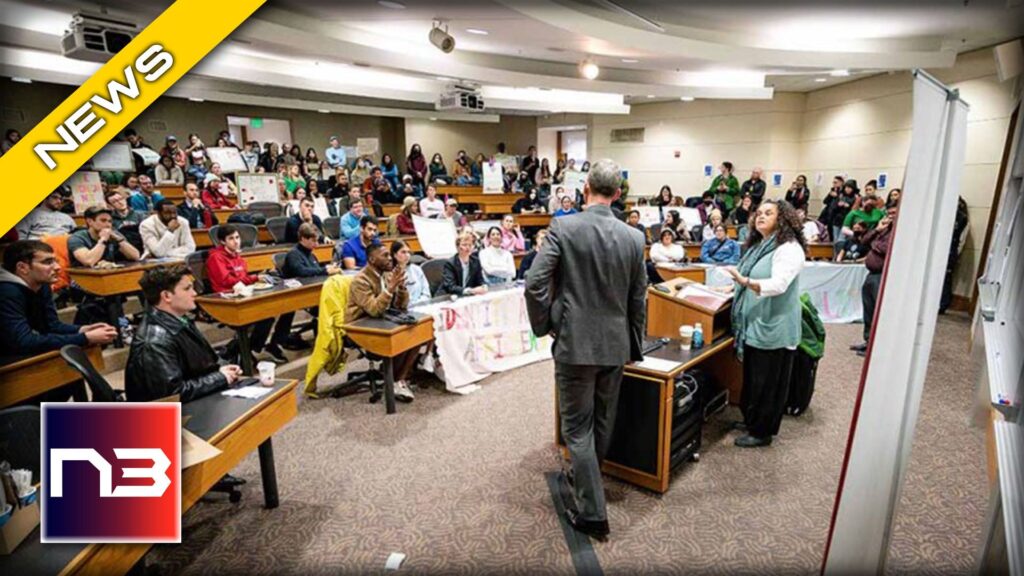In what has been dubbed “intellectual terrorism,” a group of Stanford Law School students are facing backlash after protesting the presence of a conservative judge on campus.
Stanford Law School is no stranger to controversy, but its latest scandal has taken things to a new level. On March 9th, students protested the presence of 5th U.S. Circuit Judge Stuart Kyle Duncan, who was invited to speak at the school. The protest caused an uproar amongst conservative judges, leading to a hiring moratorium for Stanford Law graduates and a pledge from Trump-appointed federal judges to boycott the university’s students.
The incident has reignited debates over free speech and civil disobedience in higher education institutions across America. Supporters of the protest argue that it was necessary in order to challenge authority and protect marginalized communities from oppressive policies; however, critics insist that it was an act of intellectual terrorism that should not be tolerated in any form or fashion.
Daily Caller reports, the incident began when Judge Duncan arrived on campus for his scheduled talk on judicial ethics and diversity initiatives in higher education institutions across America. As soon as he began speaking, several dozen students stood up and began chanting slogans such as “No justice! No peace!” and “We won’t be silenced!”
Instead of the protestors being escorted out, they were instead backed up by their Dean, who berated the Federal judge.
“You obviously haven’t been giving talks to Stanford Law students, have you?” 😹pic.twitter.com/nrEgwpepqq
— isaMΞ👻四方游侠💬صباح الخير (@QuantoQuant) March 30, 2023
This incident sparked outrage amongst conservative judges across America who felt that their freedom of speech had been violated by these protesters’ actions.
In response, several prominent Trump-appointed federal judges announced that they would be boycotting Stanford Law School graduates until further notice due to their perceived lack of respect for authority figures such as Judge Duncan.
Judges for the US Court of Appeals of the Fifth and Eleventh circuits, Judge James Ho and Elizabeth Branch, respectively, announced they would not hire future Stanford students to clerk for them, similarly to what they did last year with Yale law,
This decision was met with criticism from many legal professionals who argued that it was unfair to punish all Stanford law school graduates for the actions of a few protesters; however, these critics failed to sway the opinion of those involved in this boycott movement who remained adamant about their stance against intellectual terrorism at universities across America.
In addition to this hiring moratorium, some critics have also called for harsher punishments against those responsible for organizing this protest such as expulsion from Stanford Law School or even criminal charges depending on how far these individuals went during their demonstration against Judge Duncan’s talk on campus.
While there is no denying that these protesters acted inappropriately by disrupting his presentation, many supporters argue that they should not be punished too harshly since their intentions were noble: they wanted to challenge authority figures like Judge Duncan whose views may be seen as oppressive towards marginalized communities in higher education institutions across America.
Furthermore, some believe that punishing these individuals too harshly could set a dangerous precedent where people are afraid to exercise their right to free speech out of fear of retribution from those in power which could ultimately lead us down a slippery slope towards authoritarianism rather than democracy which is something we must strive hard not let happen here in America today no matter how controversial certain issues may be at times like this one involving Stanford Law School protests.
At its core, this incident highlights just how important it is for us all – regardless of our political beliefs -to respect each other’s right to free speech even if we disagree with what is being said or done by others around us sometimes even if we don’t necessarily agree with them either sometimes even if we don’t necessarily agree with them either . We must remember that without open dialogue between different groups within our society then progress can never truly be achieved so let us all strive hard together now more than ever before today now more than ever before.



